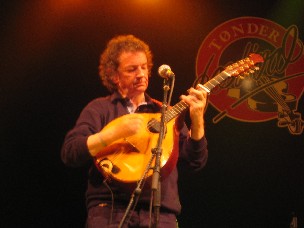FolkWorld Issue 35 02/2008; Book Reviews by Walkin' T:-)M
T:-)M's Night Shift
Ewan MacColl, Andy Irvine, Richard Seaman, Iowa
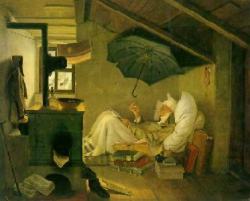 MacColl adopted his characteristic on-stage-posture - sitting up straight on a
back-to-front chair, elbows resting on the chair back, occasionaly cupping one
ear with the palm of his hand to bring his voice closer and block out surrounding
noise. Peggy sat a few feet to his left, instruments beside her. From a pool of
light in the shadowed stage, they worked through twenty-six songs they joined in
for one another's choruses, some they sang together.
MacColl adopted his characteristic on-stage-posture - sitting up straight on a
back-to-front chair, elbows resting on the chair back, occasionaly cupping one
ear with the palm of his hand to bring his voice closer and block out surrounding
noise. Peggy sat a few feet to his left, instruments beside her. From a pool of
light in the shadowed stage, they worked through twenty-six songs they joined in
for one another's choruses, some they sang together.
They will never be forgotten:
Ewan MacColl (1915-89) and
Peggy Seeger (->
FW#31,
FW#31,
FW#33,
FW#35).
For their songs, their performances and their concert formula. Peggy Seeger
performed American folk
songs and ballads, most of British and Irish origin, punctuated by her own titles
and a set of banjo tunes; MacColl sang mainly Scottish and English folksongs, some
unaccompanied, some with Seeger's accompaniments on guitar, banjo or autoharp. Songs
were prefaced with introductions that sketched in the historical context and drew
out the political undertones. MacColl's introductions typically ranged from Burns'
politics, the class tensions expressed by a particular ballad, or the survival of
folksong into the industrial age: the underlying theme was that folk music
represented a record of working-class experience and feeling.
On Burns Night 25th January 1915,
Ewan MacColl was born as James Henry Miller in Salford, Lancashire, England.
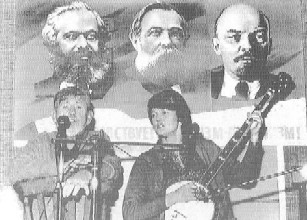
Forward unemployed, forward unemployed
Led by the NUWM,
We fight against the cuts again.
From fighting Birkenhead, we've learnt our lesson well.
We'll send the National Government
And the Means Test all to hell.
|
His father, a semi-professional pub and music hall singer,
was from Stirlingshire, his mother from Perthshire, Scotland.
Jimmie Miller's native tongue was the language of class and class struggle.
He joined the Young Communist League aged 14 and became a
regular in radical theatrical plays. Jimmie soon
formed his own agit-prop street-performing group, the Red Megaphones.
When he left school, he went straight into unemployment.
The Means Test of 1931 hit Jimmie's generation especially hard:
wherever one parent in a household was working, unemployed sons and daughters
were likely to lose their benefit.
The issue became one of his first songs.
Back then the working class youth was demanding
open access to the countryside, lower fares and the lifting of the current ban on open-air singing. The Times bemoaned
a mob of young men and women - hatless, raucous, yellow jerseyed, slung with concertinas.
Jimmie wrote "Mass Trespass 1932,"
to the tune of the Scottish "The Road to the Isles".
His party colleague Natt Frayman recalled:
I heard somebody singing "The Road to the Isles" and somebody said, Have you heard that? They've pinched Jimmie Miller's song and put new words to it.
In 1932 he wrote his first significant song, "The Manchester Rambler," to an original tune. The song was widely covered by folk artists from the late 1950s onwards.
During the Spanish Civil War (-> FW#26)
two close friends were killed as British volunteers who joined the International Brigades. He wrote "Jamie Foyers" and
updated the text of lamenting a Perthshire militiaman killed in Spain during the Peninsular Wars.
In 1938 an undercover police officer attended a Manchester Daily Worker fundraiser and filed a special report on
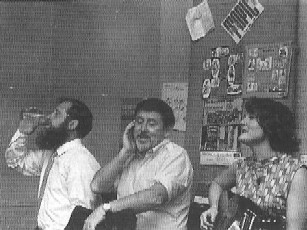
I've been over Snowdon, I've slept upon Crowdon
I've camped by the Waynestones as well
I've sunbathed on Kinder, been burned to a cinder
And many more things I can tell
My rucksack has oft been me pillow
The heather has oft been me bed
And sooner than part from the mountains
I think I would rather be dead
I'm a rambler, I'm a rambler from Manchester way
I get all me pleasure the hard moorland way
I may be a wageslave on Monday
But I am a free man on Sunday
|
a youth named Jimmy Miller who was the MC for the dancing and showed exceptional ability as a singer and musical organiser.
In Mid 1940 he was called-up into the armed services.
In December he was officially declared a deserter.
In May 1945 he resurfaced, sporting a freshly grown beard and a new name.
Jimmie Miller started to call himself Ewan MacColl. It was
the anglicised name of 19th century Gaelic poet and songwriter Eóghan MacColla of Lochfyneside. Furthermore, W.D. MacColl was a Gaelic revivalist, and
one Ewan was the name of two characters in
Grassic Gibbon's trilogy "A Scots Quair,"
one a fervent young communist, the other a shot deserter.
After the Labour Party's electoral landslide, Ewan wrote "Johnny Noble,"
an hour-long ballad opera where two singing commentators would comment on events
through the folksongs he'd written. His
play "Landscape with Chimneys" from 1951 featured the signature tune "Dirty Old Town."
In later life MacColl would become uneasy with the song's mass popularity,
played and recorded by almost anyone in the folk music scene (e.g. ->
FW#22,
FW#33,
FW#34).
In 1956, he met Peggy Seeger and they embarked upon a life-partnership.
Peggy and Ewan became a well known singing duo.
In 1957, he wrote a series of musical documentaries for BBC radio
which came to be known as radio ballads.
These were a combination of narration and oral testimony, sound effects and
new songs written in the folk idiom. The series has been recently reissued by the
Topic label,
new radio ballads issued by the BBC only recently
(-> FW#33).
Ewan MacColl was soon playing a key role in the folksong revival in Britain. In London he co-founded the Ballads and Blues Club which
played a significant part in inventing the institution of the British folk club.
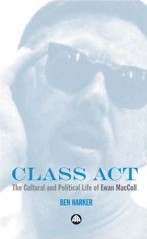
Ben Harker, Class Act - The Cultural and Political Life of Ewan MacColl.
Pluto Press, London, 2007, ISBN 978-0-7453-2165-3, 348pp, £15.99.
 @
amazon,
jpc @
amazon,
jpc
|
In 1962 there were at least 70 folk clubs in Britain,
three years later the figure was almost 300.
In a typical week in 1962, there were twenty-seven folk club nights and concerts in and around central London alone.
In the first few months at High Holburn the young audience heard musicians including
Irish Republican raconteur, writer and singer Dominic Behan, virtuoso piper Seamus
Ennis, calypso singer Fitzroy Coleman, seventy-two-year-old Norfolk farm-worker
and folk singer Harry Cox, A. L. Lloyd and MacColl. The two or three guests would
sit on the small stage and sing songs. Others would be invited to perform from the
floor. MaColl wrote: We tell stories, talk about songs sung and generally raise
merry hell.
Was Ewan MacColl larger than life (Vic Gammon ->
FW#31) or an
egotistical sod (Martin Carthy ->
FW#18)?
Ben Harker's Class Act - The Cultural and Political Life of Ewan MacColl
is an attempt to show the human side of an icon.
It is the first ever biography of the political activist and acclaimed musician, and
prepared with the authorisation of his collaborator and widow, Peggy Seeger.
MacColl certainly was an outspoken, hence controversial character.
For example, he imposed a rule that performers restrict themselves to music
from their respective national tradition.
Ben Harker points out the contradictions.
Hadn't music always been wonderfully oblivious to national boundaries?
Why were nation and region important at all?
Why did being from the right place and having the right accent entitle someone
to perform music when they might be from a social class, gender of religion that
actually had nothing to do with that music? Why should Peggy Seeger
be entitled to sing 'Freight Train', a song collected from her family's African-American
housemaid, when a vast social, economic gulf separated the Seegers from that housemaid's world?
Weren't Seeger and MacColl themselves above all a fusion act who brought instruments
associated with American folk music (banjo, steel-string acoustic guitar, autoharp)
into creative tension with British traditions of unaccompanied singing?
Irishman Andy Irvine was crossing boundaries and borders all his life. From west to east and
vice versa, but still true to his own native tradition.
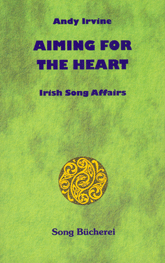
Andy Irvine, Aiming for the Heart - Irish Song Affairs.
Heupferd, Dreieich, 2007, ISBN 978-3-923445-05-9, 105 S, €16.
|
His voyage began in 1968. The one and only album of
Sweeney’s Men
(-> FW#31)
had just been published. He was one of the pioneers of the Irish bouzouki,
without it modern Irish Music would not be the same.
But Andy left Dublin and hitchhiked towards Eastern Europe.
After he was back, history was written.
Andy Irvine is the singer-songwriter's singer-songwriter
(to play on the well-known term musician’s musician).
"Never Tire of the Road" is the title of one of his songs,
and you can take it literally.
He is a well-known figure on stages of small and big clubs,
in concert houses and on festivals.
Performing solo, in duos and as part of
Planxty (-> FW#27,
FW#30),
Patrick Street (-> FW#24)
and Mozaik (-> FW#30,
FW#31,
FW#34).
The German Heupferd Verlag published a revised edition
of Andy Irvine's songbook Aiming for the Heart - Irish Song Affairs.
In both German and English, with lyrics, notes, chords, comments,
illustrations by Eamonn O’Doherty, an introduction by Paul Brady,
and discographical datas.
Featuring famous songs that Andy Irvine wrote: "West Coast of Clare",
"Rainy Sundays", "Baneasa's Green Glade" and "My Heart's Tonight in Ireland".
Traditional songs he adapted and made unmistakably his own:
"Arthur MacBride", "Bonny Woodhall",
"You Rambling Boys of Pleasure" and "Thousands are Sailing".
The dance tune "Smeceno Horo," which he brought back from Bulgaria;
and "Blood and Gold," Jane Cassidy's lyrics taken from a Romanian song
set to music by Andy.
Let us finish this section with one of his songs, "West Coast of Clare."
Andy started to write it in County Clare and finished it in Ljubljana in 1968.
Sorrow and sadness, bitterness, grief
Memories I have of you, won't leave me in peace
My mind was runnung back to the West Coast of Clare
Thinking of you and the times we had there
I walked to Spanish Point, I knew I'd find you there
I stood on the White Strand and you were everywhere
Vivid memories fade but the mood still remains
I wish I could go back and be with you again
In Milltown there's a pub, it's there and I sit down
I see you everywhere your face is all around
The search for times past, contains such sweet pain
I'll banish lonesome thoughts but they'll return again
Florida, the Sunshine State in the south west of the United States, means
Disneyland and the Kennedy Space Center, swamplands and miles of beaches. The
state is not really known for a well-known musical scene. However,
there is Chubby Wise,
one of the pioneering bluegrass fiddlers with
Bill Monroe's Blue Grass Boys and co-writer of "The Orange Blossom Special"
(-> FW#25,
FW#28,
FW#34).
This tune is so overplayed by tyros that it is banned from most fiddle contests.
There is George Custer,
who played with Bob Wills'
western swing bands,
and Vassar Clements,
who became one of the top session players in Nashville.
Furthermore, there is Richard Seaman (1904-2002). Richard who?

Gregory Hansen, A Florida Fiddler - The Life and Times of Richard Seaman.
University of Alabama Press, Tuscaloosa, 2007, 254pp,
ISBN 0-8173-1553-5, US$ 45.00.
|
Richard Seaman was born in Kissimmee Park and he began playing the fiddle by 1912.
I don't know how old it is. It was hanging up on the wall as far back as I can
remember in the old house I was born in. It just hung there. My dad didn't play
it. And after I got big enough to get around them woods they had square dances.
So I used to go around to the square dancing, and I heard them old boys play. I
liked that. I went home, and I was trying to learn it by ear. When I first started,
my mother says, 'I can't stand that. That's terrible. You can get outside.' She
made me go outside and sit on a stump. And one day she said, 'Now the better
you play, the closer you can get to the house.'
It was five years before I ever played a tune indoors.
Fiddling and dancing were intervowen into Florida's social fabric.
Compare the following extracts with those of dancing on Tory Island (->
FW#34):
Picnics and square dancing were about the only two real outings we had in those
days. Because there wasn't nothing else to do, we had to do something to create a little excitement.
Everybody that lived around there had a cow, some horses, and some hogs. Every
afternoon all that stock had to be fed and taken care of. After you got all that
done and had your supper, it was generally after dark a little bit. They'd gather
over to somebody's house.
Carpets and stuff like that, very few people had them. If they did, we'd roll
them up. We'd sprinkle corn meal on the hardwood floor, and the floor would be
real slick.
It was a lot of fun. Callers would get up there and would call out the set to
the best of his ability. And we'd try to do it. If you didn't follow that caller.
why, it was no harm done. It just kept right on going anyhow. They ddin't pay
no attention to the musicians, once they got started. They was too interested
in what they were doing. They had done established the tempo, and they would
keep going. Just as long as they could hear some music in the background, they
weren't caring much what you played.
We never had a band there. It was always just one fiddle. Maybe there'd be two
there, but one would relieve the other one. They never had a band. I never even
seen a guitar until I was sixteen years old.
Sometimes the dancers went along with no tune at all. It was a beat or a swing.
If you could get them dancing, they didn't give a dang as long as you've got a
rhythm. They'd take two sticks - similar to sawed-off broom handles - and sit
down there and tap them on the floor. And they'd just get a rhythm started and
then go ahead and dance.
Richard moved from rural central Florida into the urban area of Jacksonville in the 1920s and took up a job with the railway. In
the 50s he formed his own band, the South Land Trail Riders, and
began to see himself more as a musician playing to a crowd rather than as a fiddler playing along with a crowd.
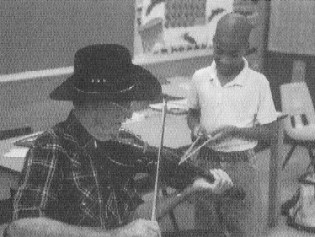
My sister used to raise honey, and she had lots of bees. Everybody liked that
honey. And she couldn't fill the demand, though, because she didn't have enough
bees. And she was always behind with her orders. But she struck up on an idea
that worked fine. She crossed them honeybees with lightning bugs, and they
could work all night long.
|
He finally stopped playing. There was
no more square dancing after World War II. The fiddle fell out of favour, and
there were few guitar players who knew how to back up an old-time musician.
(Many lost interest in playing in those times.
Beisswenger gives an account of Melvin Wine
who gave up fiddling because of religious reasons,
-> FW#31.
The shifts in public tastes and the loss of venues for old-time music are
described in Malone/Stricklin's "Southern Music/American Music,"
-> FW#29.)
The fiddle sat up on the mantlepiece for 30 years.
At the age of 82 Richard picked up the fiddle once again to perform
at festivals, workshops and schools as part of educational programs.
Gregory Hansen's A Florida Fiddler - The Life and Times of Richard Seaman
includes a set of Seaman's old-time fiddle tunes, hoedowns (jigs, reels, etc.)
played for decades at square dances and fiddle contests. No tune is unique to Florida,
e.g. "Ida Red" (-> FW#29,
FW#32),
"I Don't Love Nobody" (-> FW#30),
"Irish Washerwoman" (-> FW#12,
FW#24,
FW#25,
FW#32),
"Sally Gooden" (-> FW#26,
FW#32).
When moving to Jacksonville, Richard was learning new tunes:
"Arkansas Traveler" (-> FW#20,
FW#26,
FW#27,
FW#30,
FW#32),
"Bill Cheatham" (-> FW#24),
"Golden Slippers" (-> FW#26,
FW#32,
FW#32).
He also learned to play in new genres: waltzes such as the
"Tennessee Waltz" (-> FW#28)
and the "Westphalia Waltz" (-> FW#30),
cowboy songs and sentimental parlour tunes such as
"Red River Valley" (-> FW#32) and
"Red Wing" (-> FW#27),
and popular radio tunes such as
"Faded Love" and "San Antonio Rose" (-> FW#28).
Hansen is also including 30 tall tales,
fictional prose narratives for comic effect and
a treasure within Florida's rich legacy of cultural heritage.
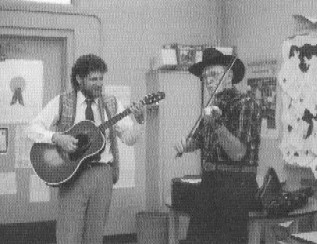
I had a little farm down there and I raised popcorn. I'd take the popcorn to
town in a horse and wagon and sell it. About halfway to town, the sun got hotter,
hotter, hotter. And it got so doggone hot, to all of a sudden, that whole
wagonload of popcorn blowed up right in the middle of the road. And to top it all
off, them two mules turned around and saw all that popcorn and thought it was
snow and both of them froze to death.
|
Hansen says that Richard is a fine storyteller.
He speaks in a soft, evenly cadenced voice that is a delight to hear.
His steady, unhurried way of speaking is reminiscent of the smooth bowing
of a master fiddler.
I had a friend that lived down in Kissimmee. He was recently married then and had
a little boy. So I went down to visit with him, and it got to doing that I had
to spend the night with him. Well, they just had a little five-room house and
two bedrooms. So they said I could share the room with the little boy. Well,
that night when we got ready to go to bed, the little boy and I went up in to
the room. And I looked over there, and that little boy was kneeling down by the
bed with his head laid down on the matress. And I said, Well, if that little
boy is man enough to say his prayers, I'll say mine too. So I got on the
opposite side of the bed and got onto my knees. The little boy looked up and said,
Mr. Seaman, what are you doing? I said, I'm doing the same thing you are.
The little boy looked up and said, Well, mama's going to be mad - the potty's on this side of the bed.
(See also Florida Folklife from the WPA Collections
an ethnographic field collection from
1937 to 1942 documenting cultures throughout Florida.)
Iowa is a state in the midwestern region of the US, bounded by the
Mississippi and Missouri Rivers. The topography is gently rolling plains.
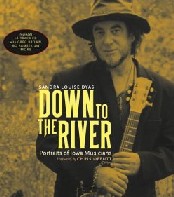
Sandra Louise Dyas, Down to the River - Portraits of Iowa Musicians.
University of Iowa Press, Iowa City, 2007, ISBN 978-0-87745-997-2, 85 pp, $29.95 (incl. CD).
|
Attractions include the Herbert Hoover Presidential museum and The Amana Colonies,
a group of settlements of German Pietists.
Iowa, as other midwestern states, is bearing the burden of rural flight,
especially of people with college degrees. On the contrary,
photographer Sandra Dyas
moved to Iowa City in 1987. She started bringing her camera to concerts
which she attended and documenting the area’s live music scene.
The sixty photos in Down to the River - Portraits of Iowa Musicians,
titled after a song by Dave Moore,
capture her twenty years of shooting musicians and songwriters in and around the city. Artists
on stage, artists in bars, artists on the prairie.
Most people over here in Europe, even Americana afficionados,
have probably never heard of most of them. Well, there is
Greg Brown of course,
the godfather of Iowa music, who poses on the book cover (->
FW#23,
FW#24).
Furthermore, there are portraits of
Joe Price,
David Zollo,
Pieta Brown,
Radoslav Lorkovic,
Kevin Gordon,
Mike & Amy Finders,
Bo Ramsey,
Kelly Pardekooper,
Tom Jessen,
The Pines,
and many others.
Sandy Dyas says:
Since photographs and music hold both memories and ideas, they can transport the viewer or the listener to another place. I am not
a musician, but I use a camera as I would play an instrument.
I wanted to include the musicians I had spent the most time listening to and dancing to, and I know all of the musicians as friends.
It is a family album, with raw and earthy black-and-white images capturing
contemplative moments as well as all-absorbing live performances.
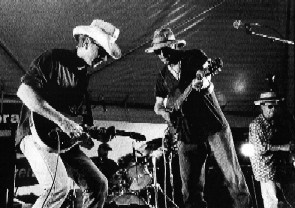
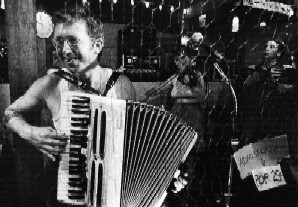
Left: Bo Ramsey & Greg Brown; right: Nitro Ground Shakers
|
There are only two or three close-ups. Most images seem to be from a middle
range perspective. Sandy says:
I am not a fan of telephoto lenses, because you are so far removed that it's
not even fun. I like to get as close as possible.
Getting connected, that's the idea.
A companion CD with eighteen tracks illustrates
what musician Dave Alvin
(-> FW#33,
FW#34)
referred to as the rough and sweet uniqueness
of the Iowa sound:
70 minutes of blues, folk, rhythm'n' blues and Americana roots rock.
Sandy Dyas again:
I think that this sound comes out of the blues and folk music and, of course, from some rockabilly and rock ’n’ roll. It’s
a mix of styles with an emphasis on rhythm. Our music rocks and you can usually dance to it. Some of the music is quiet, sad, beautiful and has a lot of feeling in it. I
think the common denominator is very good writing.
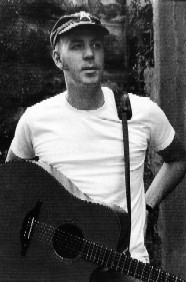
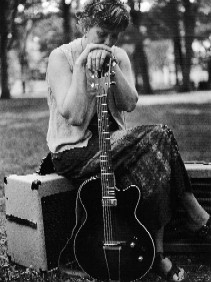
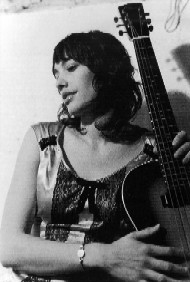
Left to right: Kelly Pardekooper, Vicki Price, Pieta Brown
|
Energy and power, but down to earth. (Well, I overheard that Iowa has the highest
average radon concentrations in the US.)
Writer Chris Offutt
puts it that way in the foreword:
Iowa music is grounded in landscape, bordered by the two great rivers of the
continent. People live with hail, blizzard, tornado, flood and drought. Every
six months, the outside temperature swings a hundred degrees. Iowans will help
you pull your truck out of the ditch, bend the fender off the tire, and tell
you where to get a good deal on a new headlight. But don't do it again, they'll
tell you, try and learn from your mistakes.
The featured musicians are still with us, but it is the roots rock sound of
the 1990's. Times are changing, so music does. Soon it is history and
the likes of them will never be seen again.
© The Mollis - Editors
of FolkWorld; Published 02/2008
All material published in FolkWorld is © The
Author via FolkWorld. Storage for private use is allowed and welcome. Reviews
and extracts of up to 200 words may be freely quoted and reproduced, if source
and author are acknowledged. For any other reproduction please ask the Editors
for permission. Although any external links from FolkWorld are chosen with greatest care, FolkWorld and its editors do not take any responsibility for the content of the linked external websites.
FolkWorld - Home of European Music

Layout & Idea of FolkWorld © The Mollis - Editors of FolkWorld
 MacColl adopted his characteristic on-stage-posture - sitting up straight on a
back-to-front chair, elbows resting on the chair back, occasionaly cupping one
ear with the palm of his hand to bring his voice closer and block out surrounding
noise. Peggy sat a few feet to his left, instruments beside her. From a pool of
light in the shadowed stage, they worked through twenty-six songs they joined in
for one another's choruses, some they sang together.
MacColl adopted his characteristic on-stage-posture - sitting up straight on a
back-to-front chair, elbows resting on the chair back, occasionaly cupping one
ear with the palm of his hand to bring his voice closer and block out surrounding
noise. Peggy sat a few feet to his left, instruments beside her. From a pool of
light in the shadowed stage, they worked through twenty-six songs they joined in
for one another's choruses, some they sang together.




